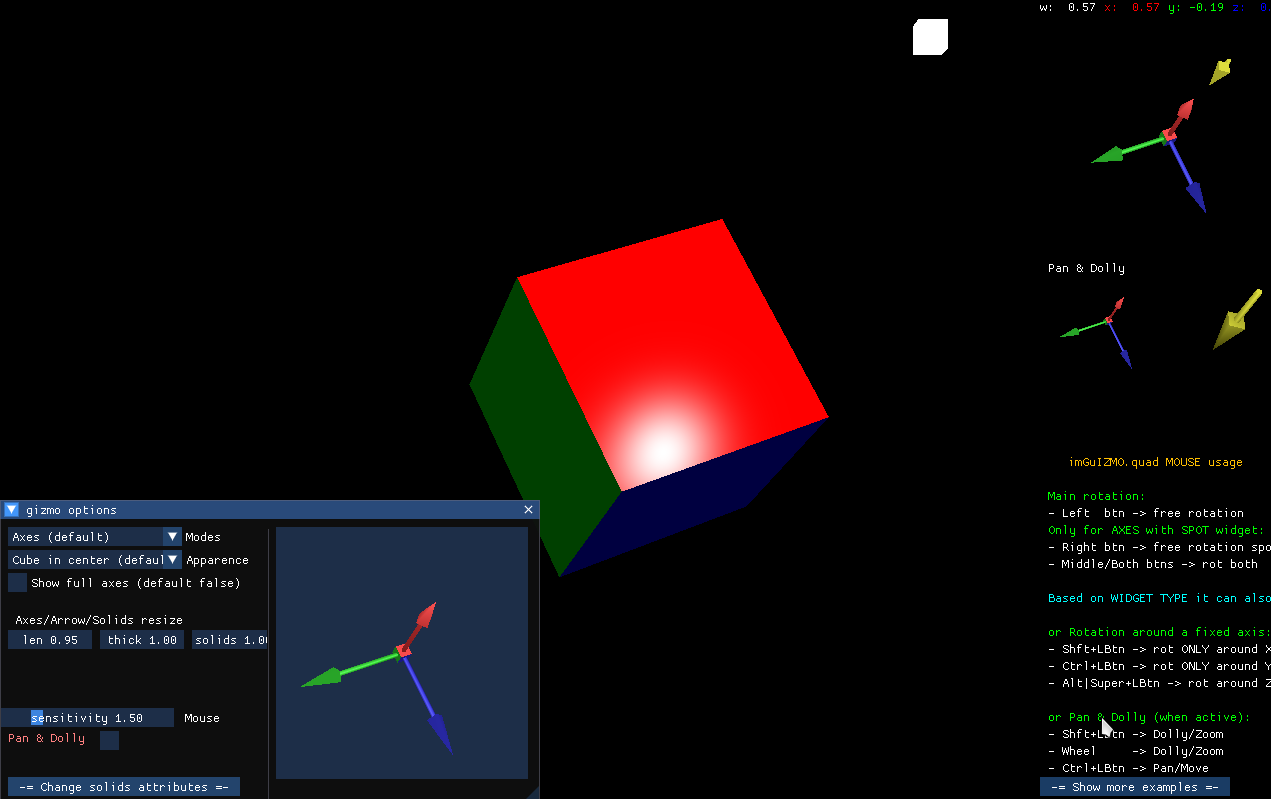6.6 KiB
ImGuIZMO_quat Vulkan easy examples
These easy examples was written using vulkan.hpp / vulkan-hpp
These "step by step" examples guide in the use of the various widgets and and how to use the transformations obtained to build an MVP matrix. They are similar to OpenGL examples or to LIVE WebGL2 glLightCube_07 or glCube_07, but using Vulkan engine. *you can find they in easy cube examples and illuminated cube
In the OpenGL version of the examples was opted to separate the GLFW and SDL versions in distinct files. If you are starting to become familiar with widgets I recommend starting from the OpenGL examples: they are more linear and differentiated (SDL/GLFW), and using (in a second time) the Vulkan examples to view the interaction with this graphical backend.
In Vulkan, given the greater complexity of the graphical interface and the integration of the framwork with the creation of the Vulkan surface and any example have CMake build options for GLFW / SDL2 / SDL3.
- GLFW is the DEFAULT option
cmake -DUSE_SDL2=ONbuilds for SDL2cmake -DUSE_SDL3=ONbuilds for SDL3 obviously is necessary to have GLFW | SDL2 | SDL3 (devel package) installed: one is enaugh
They were encapsulated in a framwork base class (and its subclasses: files framework.cpp and framework.h): these classes manage mouse and other framework events, and also ImGui specific framwork interaction (for ImGuIZMOquat) in a univocal way.
This permits more linearity in reading the code (in "main render loop/function") and all the framework calls are well commented to show the specific use.
The vkCube code is divided into (main) 2 parts:
vkAppBase classthe bulk of Vulkan initializationvkApp classdraw and manipulate scene objects (and initialization of ImGui)
All widgets/controls and 3D manipulation code (or almost) was relegated in the run() function (of vkApp class, of vkCube_*.cpp files).
(look also setScene() )
For those who want to use too vGizmo3D The initialization of vGizmo3D (framework agnostic) is in the framework class The mouse control events and the key modifier checks are specific for any framework:
-
GLFW: check Key Modifiers - check Mouse event
-
SDL2/SDL3: check Key Modifiers - check Mouse event
Different representation of the 3D space
Despite a different representation of the 3D space between Vulkan and OpenGL/Webgl, there are no changes in the use of imgiuzmo_quat / ImGuIZMO.quat or vGizmo3D. This not also thanks to ImGui (or GLFW/SDL for vGizmo3D) that report same mouse coords on widget ([0,0] is in top-left corner), but mainly thanks to the choice to select a "clip matrix" consonant to my needs to build MVP Matrix.
In vkCube_* examples I have used a clip-Matrix with (only) Y inverted and "half" Z.
If you have difficulty to understand my transforms, I invite to read: Setting Up a Proper Projection Matrix for Vulkan, by Johannes Unterguggenberger (not same, but very similar) Are also mentioned other tecniques to maintain compatibility on grahical backends (OpenGL/Vulkan), also the Flipping the Vulkan viewport used by Sascha Willems in some of your "very famous" Vulkan C++ examples and demos
Using the clip-Matrix have allowed me to have a rapresentation of 3D space similar to "Cartesian" 3D space (Y grows up) also in Vulkan. But, since everyone can do what they want with their own "model" in the ImGuIZMO.quat / vGizmo3D v4.0 I added the possibility:
- To reverse: X/Y rotation, X/Y Pan & Dolly movements (code setting or defaults: via
imguizmo_config.hor compile defines) - To reverse (toward/direction) the widget axes, grafically, to adapt to your 3D space (only imGuIZMOquat, of course)
In this example/s I added some other models of 3d space "transformation":
e.g. full inversion -Y and -Z axes, or "untouched" Vulkan space (Y grows down, and Z forward), without clip-Matrix, to show how to use/set flipping rotation on controls.
In the end of vkCube.h you can find these possibility (un-comment what you prefer)
Build examples
CMakeLists.txt file is provided to build the examples
From command line (where is CMakeLists.txt) type:
mkdir build==> create a directory where to buildcd build==> go to in it
Then execute CMake depending on your settings (devel packages installed). For example, use:
cmake -G Ninja ..==> to build with ninja and GLFW frameworkcmake -G "Unix Makefiles"" ..==> to build with make and GLFW frameworkcmake -DUSE_SDL3=ON -G Ninja ..==> to build with ninja and SDL3 framework
And now run the command:
ninja or make -j or run the building system chosed to build examples
*obviously is necessary to have GLFW | SDL2 | SDL3 (devel package) installed: one is enaugh *currently tested in Linux, but it should also work in Windows and/or MacOS... it will be tested soon on both
